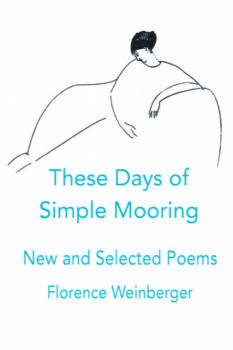If brilliance can ironically be subtle, this is what we encounter in the New and Selected oeuvre of Florence Weinberger. As delicate, meditative, and buoyant as the mooring she alludes to in the title, the poems—lyrics cleverly disguised as narratives—untether ever so meticulously until they reach the point of tautness—we are set upon the tide in between the lights that are shore side and the great unknown of the sea’s vastness, afloat. Effortlessly, floating.
These Days of Simple Mooring allows us a certain reach out into oceans of experience, of course hers yet by such accurate personal illustration, ours, too. Words, as flotsam and jetsam. The mysterious ebb and flow of life. Coming, in waves. She is a master of making existence’s complexities so very gloriously simple and liquid clear.
She speaks the notions we all have thought and felt yet we have failed to voice. For example, in reminiscence of a soul that was, still is, will always be—the poetess sees the life of one loved in the presence of the natural world that so enchantingly captivates: “Ever since my conceit that you died into a bird—or rather many birds—I spotted you in every gull, sparrow, and starling.”
Who among us doesn’t appreciate the transformation of being, into that of a murder of crows, or a business of ferrets, or a friendly tribe of feral cats, as we, all creatures of the wild, share the selfsame qualities of the animals we fixate on? We live in a culture that often regards our faunal companions as family members and it is this brazen notion of affection Weinberger alights upon in her poem “Bird Watch.” It so honestly equates the memory of another into the personification of what finally becomes Yeats’ hawk, who convinces the speaker … “that was you: fierce, determined to survive, some days a little piece of my heart in your mouth.”
The writer, with the fluidity and talent unbridled switches from staid free verse narrative to raging stream of consciousness, mini Howls that are as beat, or mystical as the psychedelic experience itself. For her and us, memory is a drug that can re-create experience in a new originality, enhanced by her incredible music freely flowing in diction, syntax, and groove:
Every day there’s a hum in the day sometimes a fly bickering with the smell of
my sun block two black holes colliding tires wobbling bikers revving egos couldn’t
miss the suss of fog the click of dog nails on pavement that’s when the afflicted
earth breaks into its solo I try to belt it out and out comes a mix of every song
I ever heard . . .
With immediacy, we’re cast into the moment, to her moment that has the ability to bounce us into remembrances of our own pasts modeled on the descriptions she creates. Visions she takes us to, or oddly enough, re-creates within us.
Perhaps a poet of a narrative inclination is at her most powerful in the form of prose. In another musing, she envisions:
asks the New York Times, and 676 people email them photographs which zing to
my email, each a landscape or legend sent from the world of people with open
eyes who open their lenses and snap what they love when it signals and tingles,
from single rocky outcrops and desert vistas to cowboys and shoppers, revelers
and trains, trash piles and pilgrims, blazing decorations, gray schist, rivers and
icons, parades and carnivals, wild faces and lined faces, the silos, the frenzied
horses, cooks and caravan where gypsies tented and repaired broken pots, my
longing stirred for what I will never jump off of . . .
The hypnotic meditation concludes as so many of our adventures into any country, any city, any place that is not ours does, until we make it our own or at least try to: “ … I went to taste the noodles, to sense the other, to break my cycles, to savor my delirium, to buy something useless and something local.” (“Why Do You Travel?”)
At a mere one hundred and eight pages, the book reads like an experiential tome that records spots of time rooted in our collective consciousness (not un-). She shares the eternities of eternity we are all offered in our life of many lives.
In the section “Breathing Like a Jew,” the poetess secures holds onto and examines those threadbare garments of identity we from time to time chose to don. Her lines echo the cultural exoticism/assimilation, diversity and richness of Yiddish in paeans to that which must never be lost to forgetfulness. Hers are tender considerations of family and friends painted in locutions so specific and accurate, it causes frission. She presents the what-we-have-been-told-to-be with a healthy distance of non-committal to the rigidity of any tradition: “There must be rituals that sever/ what harms our connection to the past/ and lets us keep the rest.”
Our immersion into her New and Selected Poems creates within the reader a certain unmooring of our understanding of the multitudinous attempts our minds devise in story-ing reality to make some sense of the glorious all and many we are. We are flung out into a sea of everything and carefully pulled back, tethered with the endless promise of release.
And think not that this is Weinberger’s swan song. The poetic richness of this prize-winning collection seems more like a mid-career jaunt into the depths of hers and our beings. Undoubtedly, there will be more to come as is hinted by the impish persona of “Masks”:
I never liked Halloween,
When I had to choose
a single disguise; so many lies
left out.
***

